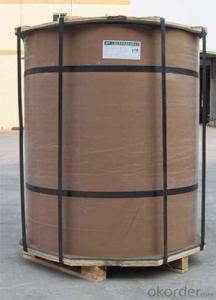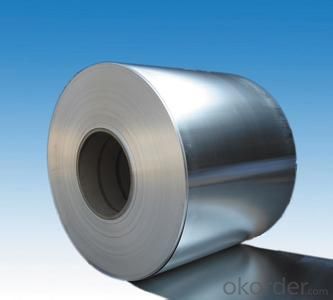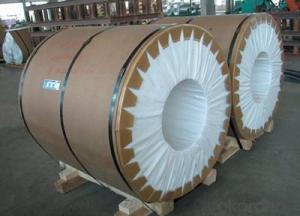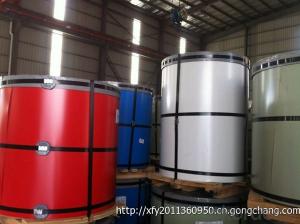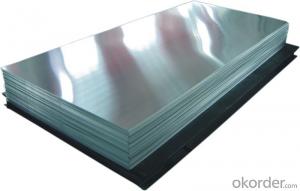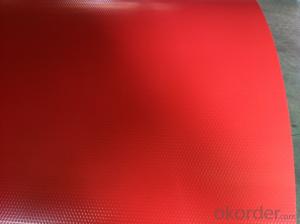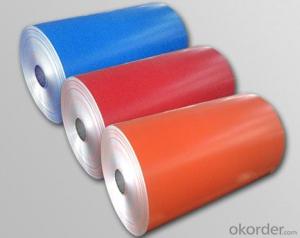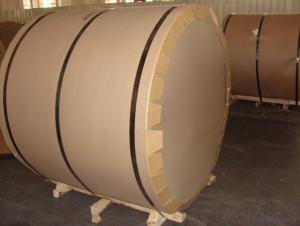Painted Aluminum 4x8 Sheets - Directed Casting Aluminium Coils for Vessel Building AA5083
- Loading Port:
- Shanghai
- Payment Terms:
- TT or LC
- Min Order Qty:
- 80 m.t.
- Supply Capability:
- 20000 m.t./month
OKorder Service Pledge
OKorder Financial Service
You Might Also Like
Specification
1.Structure of Directed Casting Aluminium Coils for Vessel Building AA5083
Directed Casting Aluminium Coils for Vessel Building AA5083 are widly used in decoration field. For the painting, it depends on the using evironment. If you use in the open air, we recommend the PVDF coated aluminium coils. This kind of painting can last 15-20 years. If you use in the room, we recommend PE coated aluminium coils. The price is much more competitive.
2. Main features of Directed Casting Aluminium Coils for Vessel Building AA5083
a.Competitive price---We have our own mills and can produce mill finished aluminium coils, so we can control the production cost better.
b.Professional after-sale service---We have more than 15 years exportation experience and you need not worry about the exporation problems.
c.Fast delivery time---We can control the delivery time within 35 days.
3. Image of Directed Casting Aluminium Coils for Vessel Building AA5083
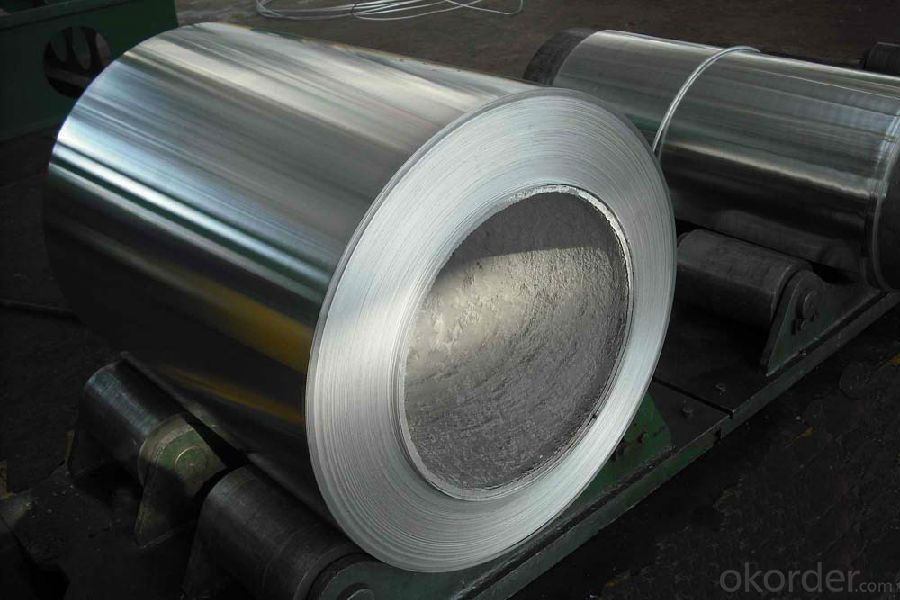
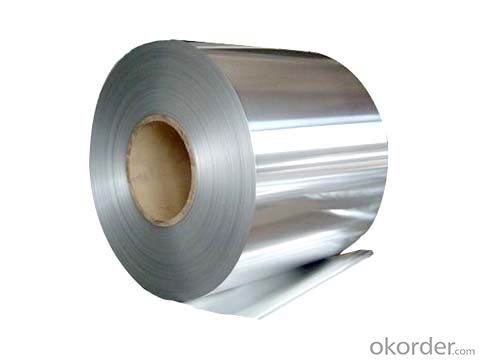
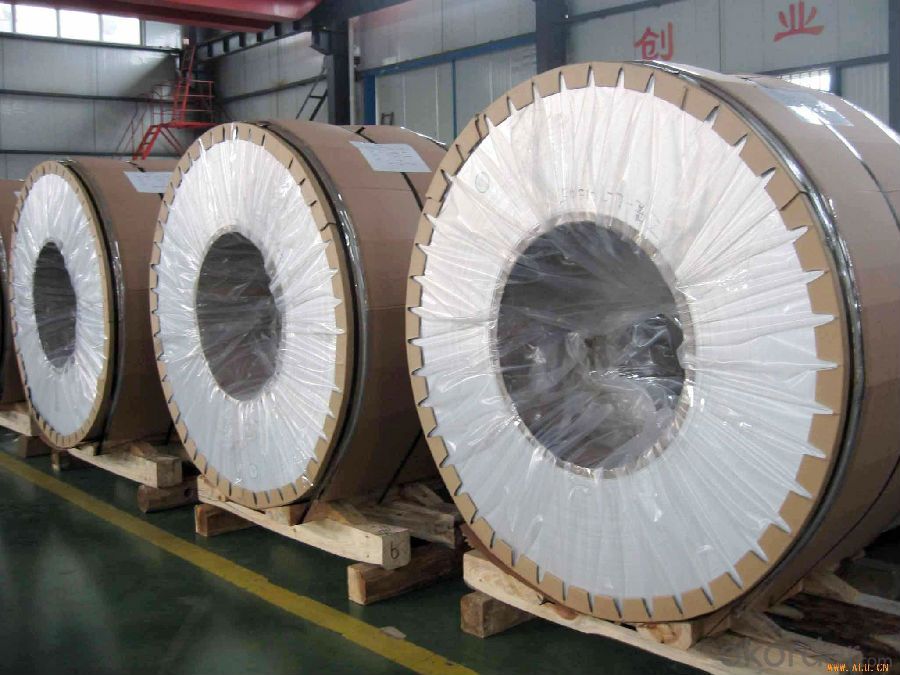
4. Product Specification of Directed Casting Aluminium Coils for Vessel Building AA5083
| Alloy | Temper | Rolling | Thickness | Width |
| AA1050 | F | Hot Rolled | 0.2MM-2MM | 1000MM-1500MM |
5.FAQ of Directed Casting Aluminium Coils for Vessel Building AA5083
What is the quality standard?
---Usually our standard is GB3880-2006
What is the largest width?
---It is 2300mm
What is the MOQ?
---Usually we can accept 80 tons.
- Q: Can aluminum sheets be used for packaging purposes?
- Yes, aluminum sheets can be used for packaging purposes. Aluminum is a versatile and popular material for packaging due to its excellent barrier properties, durability, and light weight. It is commonly used in various forms such as aluminum foil, cans, and containers for packaging a wide range of products including food, beverages, pharmaceuticals, and cosmetics. Aluminum sheets offer several advantages for packaging purposes, including resistance to moisture, oxygen, light, and bacteria, which helps to protect the contents and maintain their freshness. Additionally, aluminum sheets can be easily shaped, molded, or folded to create different packaging designs, making it a preferred choice for many packaging applications.
- Q: What are the limitations of using aluminum sheet?
- There are several limitations associated with using aluminum sheet in various applications. Firstly, aluminum is a relatively soft metal compared to other options such as steel or titanium. This means that it is more susceptible to scratches, dents, and deformation under heavy loads or impacts. Therefore, it may not be suitable for applications that require high strength or resistance to damage. Secondly, aluminum has lower thermal conductivity compared to other metals. This can be a disadvantage in applications where efficient heat transfer is crucial, such as in heat exchangers or cooling systems. Thirdly, aluminum is prone to corrosion. Although it has a natural oxide layer that provides some protection, it can still corrode in certain environments, especially in the presence of moisture or acidic substances. This limits its use in applications where corrosion resistance is vital, such as marine or chemical industries. Additionally, aluminum is a relatively expensive material compared to other options. Its production and extraction processes require significant energy and resources, contributing to higher costs. Therefore, it may not be the most cost-effective choice for some applications. Lastly, aluminum has limited compatibility with certain substances. It can react with certain chemicals, resulting in degradation or contamination. Therefore, it may not be suitable for applications where it will come into contact with substances that can cause adverse reactions. Overall, while aluminum sheet has numerous advantages such as its lightweight nature, good electrical conductivity, and ease of fabrication, it is important to consider its limitations when selecting it for specific applications.
- Q: This question asks for methods to prevent aluminum sheets from warping or curling during processing or storage.
- <p>To prevent aluminum sheets from warping or curling, ensure proper storage by keeping them flat and avoiding stacking them under heavy loads. Maintain a controlled environment with consistent temperature and humidity to prevent expansion and contraction. When cutting, use sharp tools to minimize heat generation and stress. Apply a stress-relieving process after fabrication to reduce internal stresses. Use appropriate jigs and fixtures during fabrication to maintain flatness. Finally, consider the thickness and alloy of the aluminum sheet, as some are more prone to warping than others.</p>
- Q: A 0.250-g sample of a magnesium-aluminum alloy dissolves completely in an excess of HCl (aq). When the liberated H2 is collected over water at 29 C and 752 torr, the volume is found to be 311 mL. The vapor pressure of water at 29 C is 30.0 torr. What is the mass percentage of aluminum in this alloy?
- Aluminum Magnesium Alloy
- Q: How do aluminum sheets perform in terms of thermal expansion?
- Aluminum sheets exhibit a relatively high coefficient of thermal expansion, causing them to expand significantly under heat and contract when cooled. This behavior stems from aluminum's nature as a metal with a relatively low melting point and excellent heat conductivity. Heating aluminum sheets increases the energy of its metal atoms, causing them to vibrate and move more rapidly, resulting in expansion. Conversely, cooling the sheets reduces their energy, causing the metal atoms to slow down and move closer together, leading to contraction. Therefore, it is crucial to consider the thermal expansion properties of aluminum sheets when using them in applications that involve temperature fluctuations, as this can impact the material's overall dimensions and performance.
- Q: What is the coefficient of thermal expansion of aluminum sheets?
- The coefficient of thermal expansion of aluminum sheets varies depending on the specific alloy used. However, on average, aluminum has a coefficient of thermal expansion of approximately 22 x 10^-6 per degree Celsius (22 x 10^-6/°C). This means that for every degree increase in temperature, the aluminum sheet will expand by 22 x 10^-6 times its original size. It is important to note that this value may slightly differ for different grades and alloys of aluminum.
- Q: This question asks for methods to determine if a building is utilizing high-quality aluminum sheets.
- <p>To determine if a building is using high-quality aluminum sheets, look for the following characteristics: the sheets should have a uniform and smooth surface without visible defects or impurities. Check for a strong and consistent thickness throughout the material. High-quality aluminum is also resistant to corrosion and should not show signs of rust or pitting. Additionally, the sheets should be lightweight yet rigid, indicating a high strength-to-weight ratio. You can also inquire about the manufacturer's specifications and certifications, as reputable suppliers will provide detailed information about the quality and composition of their aluminum sheets.</p>
- Q: my grandpa gave me a family harloom, a 1971 Honda Trail 90, after it sat in a shed for a good 30 years. i have got most everything in tip top shape except for the polished aluminum has become lightly tarnished. and because i am a perfectionist
- You can use furniture stripper to dissolve the clear-coat. Then you can polish up the parts using Simichrome or other chrome polish. Then spray on a new clear-coat. I used a Harley-Davidson product in the past (on a Honda) with very good results. Note that you may get a finish which is actually glossier than the original Honda finish. You may prefer that, or you may be more interested in replicating the original finish. It all depends on what you want, and how far you go with the polishing. In my case, I ended up having the parts professionally triple chrome plated several years later for a really custom look (once I had the money to do it). BTW, your cases are made of an aluminum alloy. Apparently, pure aluminum does not tarnish, but is not considered strong enough.
- Q: Can aluminum sheet be used for decorative purposes?
- Yes, aluminum sheet can be used for decorative purposes. Its lightweight nature, durability, and versatility make it a popular choice for various decorative applications such as signage, wall cladding, ceiling panels, furniture accents, and more. Additionally, aluminum sheets can be easily manipulated, painted, or coated to achieve different finishes, colors, and textures, allowing for endless possibilities in decorative design.
- Q: Can aluminum sheets be bent or formed?
- Yes, aluminum sheets can be bent or formed. Aluminum is a highly malleable and ductile metal, which means it can easily be shaped or bent without breaking. This characteristic makes it a popular choice for various applications, such as manufacturing automotive parts, aircraft structures, and household items. Aluminum sheets can be bent or formed using various techniques, such as press braking, roll bending, and stretch forming. These methods allow the aluminum sheets to be shaped into different angles or curves to meet specific design requirements.
Send your message to us
Painted Aluminum 4x8 Sheets - Directed Casting Aluminium Coils for Vessel Building AA5083
- Loading Port:
- Shanghai
- Payment Terms:
- TT or LC
- Min Order Qty:
- 80 m.t.
- Supply Capability:
- 20000 m.t./month
OKorder Service Pledge
OKorder Financial Service
Similar products
Hot products
Hot Searches
Related keywords
